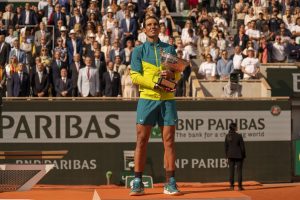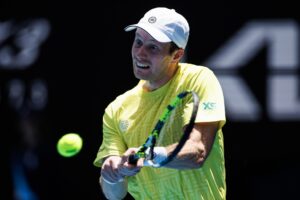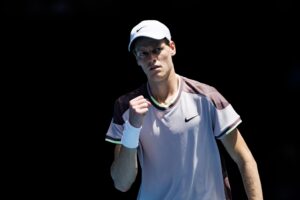Tennis by its nature is a sport of opposites. At the end of every point, game, set, and match there is a winner and there is a loser, the ecstasy of victory and the agony of defeat. And this year, the fourth round at Melbourne Park threw up two particularly symbolic contrasts.
In the first men’s singles match of the day on Rod Laver Arena, Tomas Berdych of the Czech Republic took on Spanish World #2 Rafael Nadal. It was the 24th meeting between the two, and Berdych had won just four of the previous 23 and only one since 2006. But there were reasons to be confident about the 33-year-old’s chances. After missing the second half of the 2018 season with a back injury, he had returned to action in Doha looking refreshed.
He reached the final, losing narrowly to Roberto Bautista Agut, who had already accounted for Stan Wawrinka and World #1 Novak Djokovic. Berdych had continued that good form in the early rounds at Melbourne Park, sweeping aside 2018 semifinalist Kyle Edmund in the first round. Robin Haase and Diego Schwartzman had also proved unable to tame the big man’s formidable power. And Berdych had won his last meeting with Nadal at Melbourne Park, thrashing the Spaniard 6-2 6-0 7-6 in 2015.
Berdych came out of the blocks fast, forcing a break point in the first game of the match. But the second seed saved it and that was as good as it got for Berdych. Nadal raised his game and his intensity levels and tore into Berdych, who looked woefully under prepared. His first serve abandoned him, his forehand misfired, and his legs were leaden. It was less of a contest than it was an execution. Swiftly, the first two sets went the way of Nadal; Berdych won just one game.
Belatedly, Berdych rose to the challenge. He opened his broad shoulders and made a match of it, answering Nadal’s blows with some of his own. Nadal was still having the better of it, forcing break points in two of Berdych’s service games. But the Czech hit his way out of trouble to keep his slender hopes alive. Then, with Nadal serving to stay in the set down 5-6, Berdych’s chance came. He forced a set point, but Nadal, not an 18-time Major champion for nothing, saved it with a big forehand.
There would be no more. Nadal forced a tiebreak, and despite going down an early minibreak, ended it by winning four points on the bounce to seal a 6-0 6-1 7-6 victory and inflict another stinging defeat on Berdych. It was Berdych’s 95th match against one of the “Big Four” and his 76th defeat. Indeed, losses at the hands of the Big Four account for over 20% of the Czech’s career defeats. And of his generation, he has one of the better records against them.
Later, in the night session, another would-be challenger took to the Rod Laver Arena in the hopes of upending one of the “Big Four,” as Stefanos Tsitsipas met third seed Roger Federer. It was their first official match, although Tsitsipas had lost 6-7 6-7 to Federer earlier in the month at the Hopman Cup in Perth. And where Berdych had started timidly, Tsitsipas came out full of belief, matching Federer winner for winner in a scintillating contest between two all-court, attacking players.
Federer edged the first set, after a superb tiebreaker, when a fan called out during the rally to break Tsitsipas’ concentration on set point. The Greek responded with a sarcastic thumbs up in the direction of the umpire, who he felt should have done more, but he otherwise shook off the disappointment instantly. He had to. Federer, now in the ascendancy, sought to apply the coup de grace to the 20-year-old’s chances. But Tsitsipas, his back against the wall, fought him off time and again.
His rearguard action, unlike Berdych’s, was fought with the match still in the balance. And Tsitsipas, unlike Berdych, did not blink when his chances came. Having reached a tiebreak in the second set, he turned the tables on Federer to win it 7-3 and level the match. Federer, slightly rattled, came again in the third set, pressing for a break. But Tsitsipas continued to hold firm and Federer’s frustration mounted. Eventually it caught him out as Tsitsipas broke at the end to steal the third.
It was there that the match turned. In the fourth set, it was Federer who was on the back foot. He, like Nadal, is a great champion able to fight through below-par performances to memorable victories. Except that against Tsitsipas, he wasn’t. Federer forced another tiebreak, but winners continued to flash off the Tsitsipas racquet past Federer, whose unforced error count was growing. In the tiebreak, he blinked first, sending a forehand long to give the Greek match point. He took it.
It was a special victory for Tsitsipas, unquestionably the biggest win of his young career. His reward was a first Grand Slam quarterfinal, where he will take on Bautista Agut in a match that looks winnable for a player of his prodigious talents. It was a win, and perhaps more importantly a performance, that will further enhance the credentials of the Next Gen as the new challengers. So too will the triumph of Tiafoe over Grigor Dimitrov and Medvedev’s conquest of David Goffin.
But it was also a win that turns the spotlight a little further still from Berdych and his peers. They are known now as the lost generation. A cadre of talents doomed to struggle fruitlessly against three of the greatest players the sport has ever seen, condemned to see their careers waste away in the shadows of greater men. And now as Father Time, slowly but surely, overtakes their august foes, they are to be denied again by a new generation looking set to stake their claim to tennis history.
It is a fate made especially cruel by the striking resemblances between them and their successors. Tsitsipas has the flair and artistry of Dimitrov, but also the power and steel the Bulgarian always lacked. Alexander Zverev looks every inch the confident, athletic big-hitter Tomas Berdych was supposed to be. And so the sting of defeat is sharpened by watching their reflections succeed as they never did. A lost generation indeed.
Main Photo:
Embed from Getty Images






